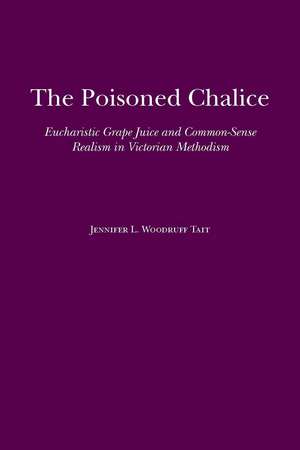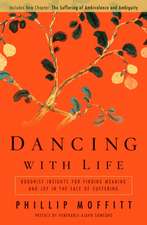The Poisoned Chalice: Eucharistic Grape Juice and Common-Sense Realism in Victorian Methodism: Religion and American Culture
Autor Ms. Jennifer L. Woodruff Taiten Limba Engleză Paperback – 30 sep 2011
Examines the introduction of grape juice into the celebration of Holy Communion in the late 19th century Methodist Episcopal Church and reveals how a 1,800-year-old practice of using fermented communion wine became theologically incomprehensible in a mere forty years
This work examines the introduction of grape juice into the celebration of Holy Communion in the late 19th century Methodist Episcopal Church and reveals how a 1,800-year-old practice of using fermented communion wine became theologically incomprehensible in a mere forty years. Through study of denominational publications, influential exegetical works, popular fiction and songs, and didactic moral literature, Jennifer Woodruff Tait charts the development of opposing symbolic associations for wine and grape juice. She argues that 19th century Methodists, steeped in Baconian models of science and operating from epistemological presuppositions dictated by common-sense realism, placed a premium on the ability to perceive reality accurately in order to act morally. They therefore rejected any action or substance that dulled or confused the senses (in addition to alcohol, this included “bad” books, the theatre, stimulants, etc., which were all seen as unleashing unchecked, ungovernable thoughts and passions incompatible with true religion).
This work examines the introduction of grape juice into the celebration of Holy Communion in the late 19th century Methodist Episcopal Church and reveals how a 1,800-year-old practice of using fermented communion wine became theologically incomprehensible in a mere forty years. Through study of denominational publications, influential exegetical works, popular fiction and songs, and didactic moral literature, Jennifer Woodruff Tait charts the development of opposing symbolic associations for wine and grape juice. She argues that 19th century Methodists, steeped in Baconian models of science and operating from epistemological presuppositions dictated by common-sense realism, placed a premium on the ability to perceive reality accurately in order to act morally. They therefore rejected any action or substance that dulled or confused the senses (in addition to alcohol, this included “bad” books, the theatre, stimulants, etc., which were all seen as unleashing unchecked, ungovernable thoughts and passions incompatible with true religion).
This outlook informed Methodist opposition to many popular amusements and behaviors, and they decided to place on the communion table a substance scientifically and theologically pure. Grape juice was considered holy because it did not cloud the mind, and new techniques—developed by Methodist laymen Thomas and Charles Welch—permitted the safe bottling and shipment of the unfermented juice.
Although Methodists were not the only religious group to oppose communion wine, the experience of this broadly based and numerous denomination illuminates similar beliefs and actions by other groups.
Din seria Religion and American Culture
- 22%
 Preț: 364.61 lei
Preț: 364.61 lei -
 Preț: 332.72 lei
Preț: 332.72 lei -
 Preț: 141.57 lei
Preț: 141.57 lei -
 Preț: 288.34 lei
Preț: 288.34 lei -
 Preț: 264.93 lei
Preț: 264.93 lei -
 Preț: 514.90 lei
Preț: 514.90 lei -
 Preț: 287.20 lei
Preț: 287.20 lei -
 Preț: 266.45 lei
Preț: 266.45 lei -
 Preț: 268.79 lei
Preț: 268.79 lei -
 Preț: 287.83 lei
Preț: 287.83 lei -
 Preț: 312.59 lei
Preț: 312.59 lei -
 Preț: 223.48 lei
Preț: 223.48 lei -
 Preț: 258.01 lei
Preț: 258.01 lei -
 Preț: 260.16 lei
Preț: 260.16 lei -
 Preț: 298.83 lei
Preț: 298.83 lei - 13%
 Preț: 362.25 lei
Preț: 362.25 lei - 13%
 Preț: 434.63 lei
Preț: 434.63 lei -
 Preț: 224.33 lei
Preț: 224.33 lei -
 Preț: 223.86 lei
Preț: 223.86 lei -
 Preț: 454.01 lei
Preț: 454.01 lei -
 Preț: 408.72 lei
Preț: 408.72 lei -
 Preț: 137.93 lei
Preț: 137.93 lei
Preț: 296.45 lei
Nou
Puncte Express: 445
Preț estimativ în valută:
56.72€ • 59.38$ • 46.94£
56.72€ • 59.38$ • 46.94£
Carte disponibilă
Livrare economică 15-29 martie
Livrare express 01-07 martie pentru 27.47 lei
Preluare comenzi: 021 569.72.76
Specificații
ISBN-13: 9780817356972
ISBN-10: 0817356975
Pagini: 208
Dimensiuni: 152 x 229 x 13 mm
Greutate: 0.32 kg
Ediția:First Edition, First Edition
Editura: University Of Alabama Press
Colecția University Alabama Press
Seria Religion and American Culture
ISBN-10: 0817356975
Pagini: 208
Dimensiuni: 152 x 229 x 13 mm
Greutate: 0.32 kg
Ediția:First Edition, First Edition
Editura: University Of Alabama Press
Colecția University Alabama Press
Seria Religion and American Culture
Notă biografică
Jennifer L. Woodruff Tait is Adjunct Professor of Church History at Huntington University, Asbury Theological Seminary, Southwestern College, and United Theological Seminary. Her articles and essays have appeared in Christianity Today, Christian History and Biography, and in American Denominational History.
Recenzii
“Many American Christians are curious about why some denominations use wine in Communion and others fill their cups with grape juice. The common response to queries on this topic usually includes some reference to the 19th-century temperance movement and to the technology of Thomas Welch and son, who developed a process to halt the fermentation of grape juice. In this volume, Tait argues that this issue is more complicated. Specifically, she contends that the commitment of 19th-century Methodists and others to Baconian commonsense realism led them to accept scientific conclusions regarding the poisonous nature of alcohol--even when used in tiny amounts. Tait finds the connection between this widely held philosophy and Eucharistic theology clearly displayed in the writings of a number of 19th-century Methodist theologians and pastors. In addition, the author discusses the subsequent and related debate over the use of individual cups in communion. Ultimately, Tait also speaks to the contemporary debate among Methodists regarding the use of grape juice in communion, and argues for the coherency of the argument once put forward by their 19th-century predecessors. Recommended. Graduate students and above.”
—CHOICE
“Tait skillfully shows how late nineteenth century and early twentieth concerns about cleanliness, and the acceptance of the germ theory of disease reinforced ideas . . . to end the use of fermented wine in communion. . . . This is a timely and important book that illuminates the logic of perhaps the single most significant and misunderstood reform movement in American history.”
--Evangelical Studies Bulletin
“Tait makes a compelling argument, and does so in an easy style. The argument is fresh, and will come as news to many historians. The style will appeal to the nonspecialist. . . . Jennifer L. Woodruff Tait has gracefully opened a door to a room full of possibilities. Hopefully, she will not be the last to enter.”
--Methodist History
—CHOICE
“I would confirm the author’s contention that studies to date of teetotalism in American religion have neglected attention to theological and philosophical dimensions of the movement, focusing on the purported role of cultural and economic factors—and have typically been very dismissive or pejorative in tone. Thus, this book makes a significant contribution to the study of the topic. It also manifests much more nuance and balance in its analysis.”
—Randy L. Maddox, author of Rethinking Wesley’s Theology for Contemporary Methodism
“Tait skillfully shows how late nineteenth century and early twentieth concerns about cleanliness, and the acceptance of the germ theory of disease reinforced ideas . . . to end the use of fermented wine in communion. . . . This is a timely and important book that illuminates the logic of perhaps the single most significant and misunderstood reform movement in American history.”
--Evangelical Studies Bulletin
“Tait makes a compelling argument, and does so in an easy style. The argument is fresh, and will come as news to many historians. The style will appeal to the nonspecialist. . . . Jennifer L. Woodruff Tait has gracefully opened a door to a room full of possibilities. Hopefully, she will not be the last to enter.”
--Methodist History
Descriere
Examines the introduction of grape juice into the celebration of Holy Communion in the late 19th century Methodist Episcopal Church and reveals how a 1,800-year-old practice of using fermented communion wine became theologically incomprehensible in a mere forty years












